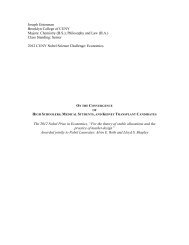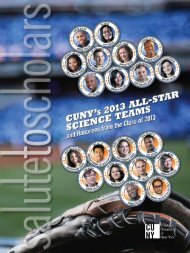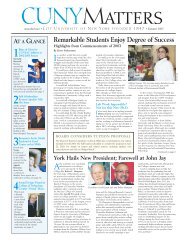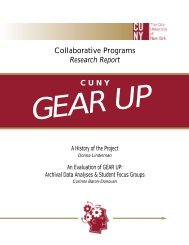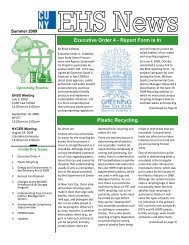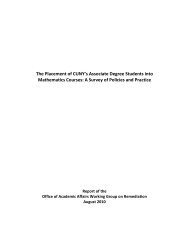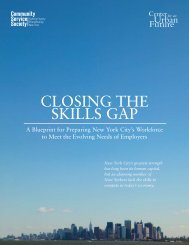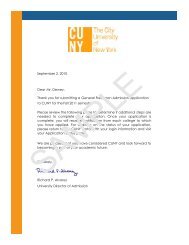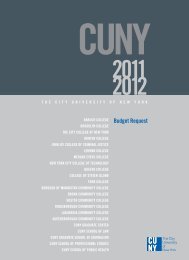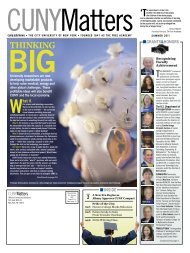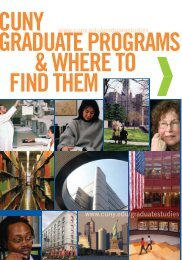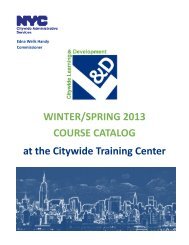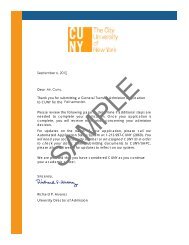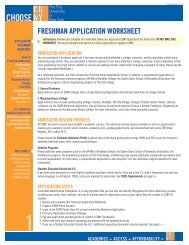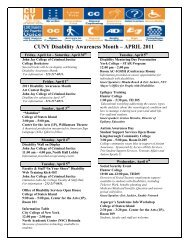CUNY Master Plan 2012-2016
CUNY Master Plan 2012-2016
CUNY Master Plan 2012-2016
You also want an ePaper? Increase the reach of your titles
YUMPU automatically turns print PDFs into web optimized ePapers that Google loves.
THE MISSION PART ONE:<br />
The University will continue to maintain and expand its commitment to academic excellence.<br />
Consonant with the University’s statutory mission “to maintain and expand its commitment<br />
to academic excellence,” this section of the plan outlines hallmarks of an outstanding 21st-century<br />
education and how the University envisions securing such achievement. Principal components<br />
include a focus on full-time faculty from diverse backgrounds; a commitment to providing the<br />
best opportunities for New York’s students to meet and exceed their academic potential, including at<br />
the University’s flagship Macaulay Honors College; an enduring commitment to improving outcomes<br />
in undergraduate education; a dedication to the ongoing mission of the Decade of Science; an insistence<br />
on a culture of evidence and assessment; a watchful eye on needs for and growth of academic programs;<br />
a reliance on a robust library system; and a determination to pursue the potential and promise of academic<br />
technology.<br />
Ensuring the Presence and Cultivation of a World-Class Faculty<br />
<strong>CUNY</strong> is privileged to have attracted a cadre of prize-winning faculty who are leaders in their disciplines<br />
and bring experience and creativity to the classroom. Part-time faculty can bring essential<br />
outside experience, new ideas, and an applied approach to learning. However, studies suggest that overreliance<br />
on these instructors can decrease the quality of education for some students and particularly<br />
disadvantage those students who are less prepared for college. 1 Studies have shown that increasing<br />
exposure to full-time faculty has a positive impact on retention, especially first-year retention and that,<br />
in particular, students appear to be negatively affected when gatekeeper courses are taught by part-time<br />
faculty other than those such as graduate fellows. 2 Furthermore, investing in full-time faculty seems to<br />
be a cost-effective way of enhancing student success. 3 Full-time faculty are more available outside of the<br />
classroom and have more interaction with their students. They are more involved in curriculum development<br />
and in the life of the college, all of which strengthen the scholarly excellence they bring to the<br />
classroom as well as to students’ overall educational experience.<br />
1<br />
Benjamin, Ernst. How Over-Reliance on Contingent Appointments Diminishes Faculty Involvement in Student<br />
Learning. Peer Review, 5(1): 4-10.<br />
2<br />
Eagan, M. Kevin Jr. and Jaeger, Audrey J. Closing the Gate: Part-Time Faculty Instruction in Gatekeeper Courses and<br />
First Year Persistence. California Community College Collaborative (C4), UC Riverside, 2008.<br />
3<br />
Harris, Douglas N. and Goldrick-Rab, Sara. The (Un)Productivity of American Higher Education: From “Cost Disease”<br />
to Cost Effectiveness. Working Paper Series, La Follette School Working Paper No. 2010-023.<br />
15



